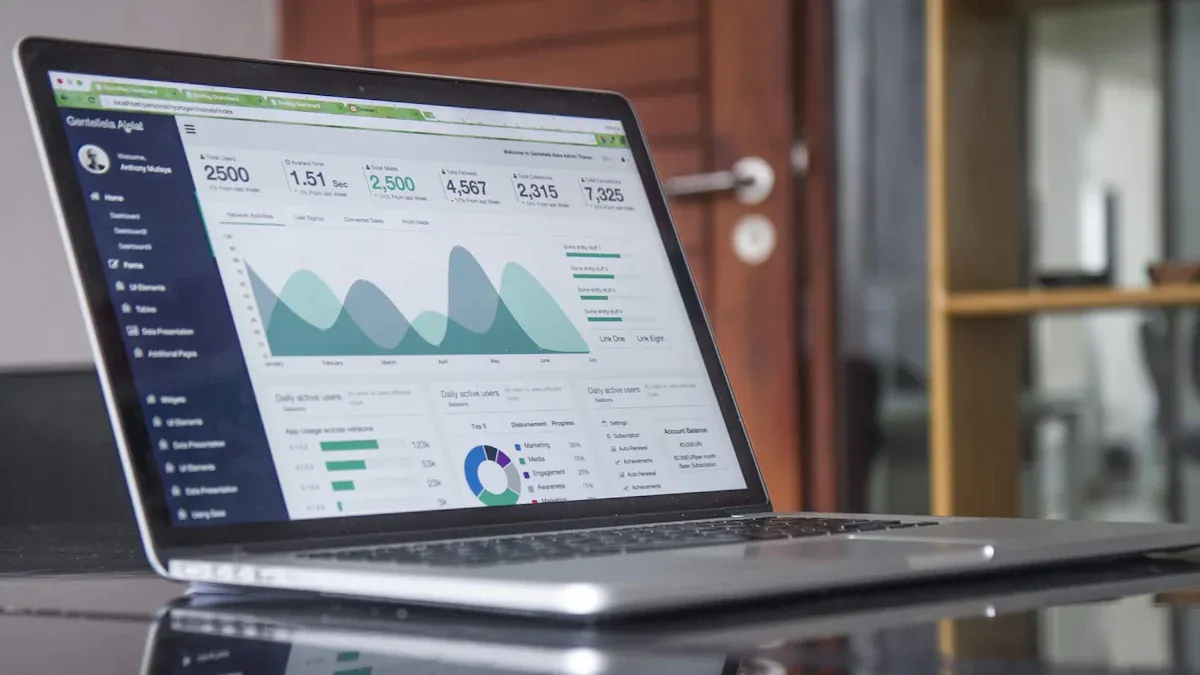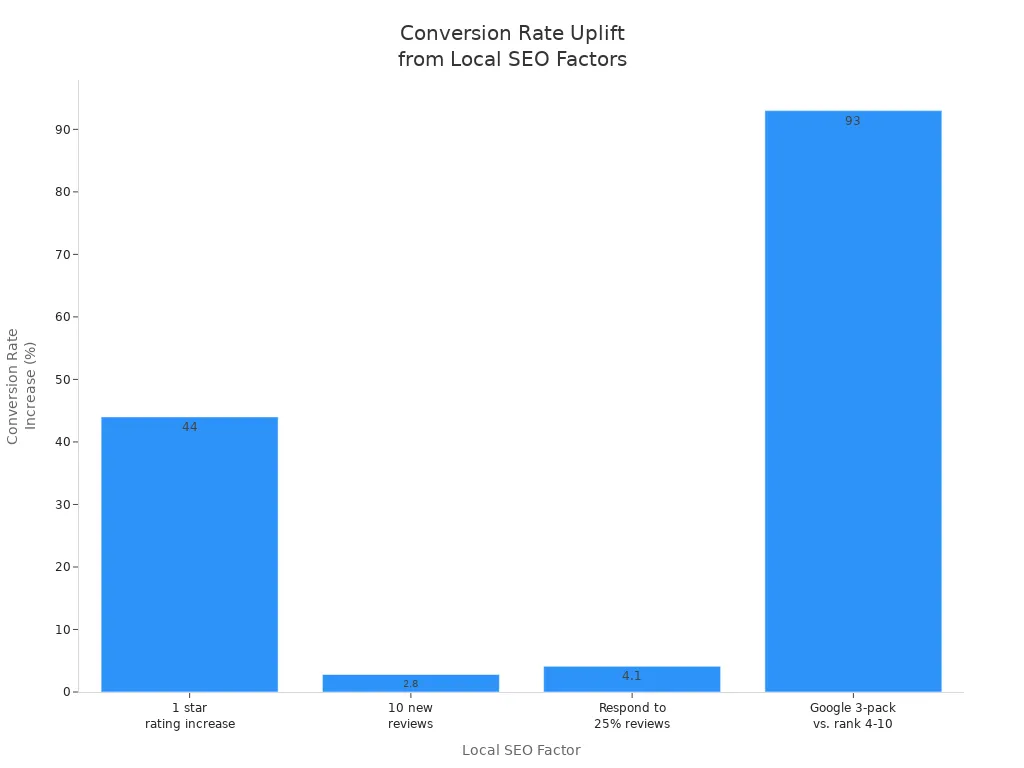3 Ways Local SEO Services Boost Multi-Location Success

Multi-location seo unlocks business growth in 2025 by using advanced local seo services that adapt to rapid digital changes. AI-powered optimization transforms local seo with predictive search and automated updates, ensuring each location remains relevant and visible. Hyperlocal content boosts multi-location seo by targeting neighborhood interests, while mobile-first strategies guarantee fast, accessible experiences for on-the-go customers. These innovations enable businesses to measure and improve local seo results at every location.
Local SEO Services for Visibility

Google Business Profile Optimization
Google Business Profile optimization stands as a cornerstone for multi-location SEO in 2025. Each location benefits from a tailored profile, which increases local search visibility and drives high-intent customers to individual stores. Optimized profiles influence user behavior by encouraging clicks, calls, and direction requests. Businesses should ensure complete and accurate NAP data, select relevant categories, and write unique descriptions for every location. High-quality photos and regular updates keep profiles active and engaging. Responding to reviews builds trust and boosts prominence. Google Business Profile management, powered by AI, automates updates and ensures every location remains competitive in the local pack. This approach supports enterprise multi-location SEO by scaling efforts across dozens or hundreds of locations.
Tip: Regularly update each Google Business Profile with new offers and events to maintain engagement and improve rankings.
Location Pages & Schema
Location-based landing pages play a vital role in local SEO for multi-location businesses. Each page should feature unique, localized content and consistent NAP details. Embedding Google Maps and customer reviews enhances user experience and trust. Structuring URLs and title tags with location-specific keywords improves relevance. Adding LocalBusiness schema markup in JSON-LD format helps search engines display rich snippets, such as business hours and ratings, directly in search results. These enhancements make listings stand out, increasing click-through rates by up to 30%. Automated schema management tools support enterprise multi-location SEO by ensuring accuracy and scalability across all locations.
Citation & NAP Management
Local citations, which mention a business’s name, address, and phone number, serve as key ranking signals for local SEO. Consistent NAP data across platforms like Google Business Profile, Yelp, and industry directories validates business legitimacy and improves rankings. AI-powered citation management tools automate monitoring, flag inconsistencies, and update listings in real time. This reduces manual effort and ensures accuracy for every location. High-quality, consistent local citations build brand authority and trust, supporting multi-location SEO strategies. Tools like Moz Local and BrightLocal help manage citations efficiently, making them essential for enterprise multi-location SEO success.
Driving Local SEO Traffic & Conversions
Hyperlocal Keyword Targeting
Multi-location businesses succeed with local seo by focusing on hyperlocal keyword targeting. Teams start by generating seed keywords related to their services. They then add geographic modifiers, such as neighborhoods or landmarks, to create hyperlocal keywords. Businesses validate these keywords using tools like Google Keyword Planner and SEMrush. They also analyze competitors and study local search trends. Incorporating customer language and local terminology helps connect with the target audience. Optimizing Google Business Profiles with these keywords and creating dedicated landing pages for each area ensures strong visibility. Including details like parking or transit information and using geo-tagged photos further boosts local seo. Adapting content for mobile and voice search, with question-based queries, captures more local traffic. This approach supports a data-driven strategy and ensures each location’s localized content stands out.
Tip: Use conversational language and answer common questions to improve voice search performance.
Local Link Building
Local link building increases domain authority and improves local seo rankings. Businesses gain the most by earning links from high-authority local websites, local blogs, and industry-specific directories. Joining local business associations and sponsoring community events also provides valuable backlinks. Encouraging customer reviews on platforms that link back to the business site boosts reputation and referral traffic. The table below highlights top strategies for multi-location businesses:
| Strategy Category | Description & Examples |
|---|---|
| High-Authority Local Websites | Links from government, universities, and local organizations provide strong authority signals. |
| Local Blogs & News Sites | Mentions in community blogs or newspapers increase relevance and trust. |
| Industry-Specific Directories | Niche directories offer targeted local seo value. |
| Local Business Associations | Chamber of commerce and networking groups add strong location signals. |
| Sponsorships & Community Events | Sponsoring local charities or events earns backlinks from event websites. |
Building local backlinks through these methods supports a data-driven strategy and strengthens localized content for each location.
Performance Tracking
Tracking performance is essential for local seo success. Businesses monitor Google My Business views, call tracking, and cost per conversion to measure visibility and efficiency. They analyze organic traffic to landing pages and monitor local pack rankings. Google Analytics and Search Console help track user behavior and keyword performance. AI-powered tools like Yext and Local Falcon automate review monitoring and provide insights for each location. The chart below shows how local seo strategies can increase conversion rates for multi-location businesses:

Consistent tracking and analysis allow businesses to refine localized content and maintain a competitive edge.
Multi-Location SEO Reputation Management

Review Monitoring
Centralized review monitoring tools help multi-location businesses manage feedback efficiently. Platforms like Local Viking and RecurPost allow teams to track and respond to reviews across all locations from a single dashboard. These tools use AI to personalize replies and automate routine tasks, which saves time and ensures consistency. Businesses that use centralized review management expertise can respond faster and maintain a unified brand voice. Customers notice when businesses reply quickly. In fact, 88% of consumers prefer companies that answer every review. This approach builds trust and improves customer satisfaction.
| Tool Name | Key Features | Real-World Impact |
|---|---|---|
| Thryv | Centralized review collection, CRM integration, appointment scheduling | Tripled review volume and increased repeat bookings by 30% in 6 months for a pet grooming business |
| Reputation.com | AI-driven sentiment tracking, local directory management | Improved customer satisfaction by 18% for a car dealership network |
| ReviewTrackers | Aggregates reviews, real-time alerts, keyword tracking | Sped up review response time by 70%, boosting trust and ratings for a home services company |
Note: Automated routing and reporting features in these tools reduce response times and provide actionable insights for operational improvements.
Encouraging Positive Reviews
Successful multi-location businesses use several strategies to increase positive feedback. Teams engage all staff members in asking for reviews, which raises review volume. They make the process easy for customers by sending follow-up emails, texts with direct links, and using QR codes at checkout. Responding to every review within 24-48 hours shows professionalism and encourages more feedback. Businesses often showcase positive reviews on their websites and social media to build trust. Automated review management expertise ensures timely, location-specific outreach and reduces staff workload. Monitoring reviews by location helps identify trends and improve customer experience. AI-powered tools like Birdeye Reviews AI streamline the process, making it easier to manage local seo efforts at scale.
- Share glowing reviews on social media to motivate others.
- Train employees to request reviews and thank customers.
- Address negative reviews promptly to turn unhappy customers into loyal ones.
Handling Negative Feedback
Handling negative feedback requires a clear plan. Each location manager should know their role in responding to reviews. Training and guidelines help staff use the right tone and respond quickly. Businesses should claim and maintain Google Business Profile listings for every location to improve trust. Regular meetings between managers and upper management help address concerns and share updates. Standard operating procedures ensure prompt and accurate engagement. When responding to negative reviews, staff should stay calm, acknowledge the issue, apologize sincerely, and offer solutions. Learning from feedback helps improve services and reduce future complaints. Using AI tools can generate professional responses quickly, supporting local seo and customer retention.
Responding to negative reviews with empathy and offering real solutions builds trust and can turn criticism into loyalty.
A strong reputation boosts local seo rankings. Google values the quantity, quality, recency, and steady flow of positive reviews. Businesses that actively manage reviews and maintain consistent information across all locations see higher visibility and customer engagement. Effective review management expertise not only improves local search performance but also strengthens customer trust and loyalty. Nearly all consumers read online reviews before choosing a business, so reputation management remains a key driver of multi-location success.
Local SEO services empower multi-location businesses to thrive by increasing visibility, attracting targeted local traffic, and strengthening reputation management. Success stories show that optimizing Google Business Profiles, building local citations, and managing reviews lead to measurable growth, such as higher foot traffic and more bookings. Businesses should:
- Create unique location pages with geo-targeted keywords.
- Maintain consistent business information across platforms.
- Monitor performance and reviews regularly.
Consulting with local SEO experts helps businesses stay ahead in a fast-changing digital landscape.
FAQ
What is local SEO for multi-location businesses?
Local SEO for multi-location businesses helps each store or branch appear in local search results. This strategy uses location pages, Google Business Profiles, and consistent business information to boost visibility in every area.
How does AI improve local SEO in 2025?
AI tools automate updates, track performance, and suggest keyword changes. These tools help businesses stay ahead of trends. AI also personalizes content for each location, making local SEO more effective and efficient.
Why is NAP consistency important?
NAP stands for Name, Address, and Phone number. Consistent NAP details across all platforms build trust with search engines. This consistency improves rankings and helps customers find accurate information for every location.
How can businesses encourage more positive reviews?
Businesses can ask customers for reviews after each visit. They can send follow-up emails or texts with direct links. Staff training and quick responses to feedback also increase positive reviews.
What metrics should businesses track for local SEO success?
Key metrics include Google Business Profile views, website traffic, call volume, and conversion rates. Tracking these numbers helps businesses measure results and adjust strategies for each location.
See Also
How To Effectively Distribute SEO Content For Marketing Success
Enhance Your Plumbing Company Growth Using SEO Solutions
Improve Your Search Rankings Using These Trusted SEO Tips
Understanding The Business Advantages Of Conducting SEO Audits

